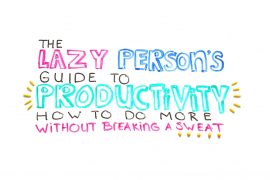Success does not lead to happiness. In fact, study shows that the external world only predicts 10% of our long-term happiness. So while buying new shoes or getting a promotion can certainly light up your day, it will not make you happy in the long run. Why is that? And what is the formula for happiness?
A study by Psychology Professor Sonja Lyubomirsky showed that 10% of our happiness is determined by our external circumstances. ONLY 10%! Furthemore, 40% is determined by our thoughts and actions. Genetics also play a large role, accounting for 50%. You could say that 90% of our long-term happiness is determined by how your brain processes the world, taking into account genetic predispositions.
The important conclusion here is that your thoughts have a 4 times greater influence on your happiness than external circumstances.
So it’s not a salary raise, a nice house or a sunny and warm environment that make you happy. It’s YOU. It’s how you look at your situation.
Why is happiness so important?
Great fact, but why do we even care about happiness so much?
Well, aside from the obvious (HELLO? Who doesn’t want to be ridiculously happy?!), happiness has a MASSIVE influence on our lives. For instance, happiness leads to better performances. A study showed that a happy state leads to employees being 31% more productive, 37% better at sales and more creative. It even leads to doctors being 19% faster and more accurate in coming up with the correct diagnosis. Happiness also leads to healthier people who are less likely to experience a burn-out.
Furthermore, happiness is accompanied by a release of dopamine. A byproducts of dopamine is that is makes people learn quicker. Being able to learn quickly from your environment not only impacts your work-life but every part of life.
If we can train ourselves to be positive and happy in the moment, we train our brain to work harder, faster, more creatively and more intelligently. And since Sonja Lyubomirsky showed that happiness comes from our thoughts rather than our circumstances, we actually have a good chance of being able to control our happiness.
Why doesn’t success lead to happiness?
The common idea in the Western world is that we should work hard in order to become successful, which then leads to happiness. The assumption here is that success leads to happiness.
But our brains do not work like this. When we achieve our goal, we set a new, bigger goal. Does this sound familiar? So the problem with linking happiness to success is that our brains never experience the success. We are already thinking about our next step.
Furthermore, we do not perform the best when we are stressing over reaching a goal. We perform best when we are positive and happy. This is what happiness researcher Shawn Achor calls the ‘happiness advantage’. He explains:
Your brain performs significantly better during a positive state than it does at a negative, neutral or stressed state.
Why is being positive so hard?
But if being happy is so good for us, why do we struggle with it? Humans are more prone to negativity: negative experiences have a bigger psychological impact on us than positive or neutral experiences. This is called the negativity bias. Because of this, humans explicitly lay a bigger focus on negative news because we view it as more important. News channels, newspapers and even talk shows and gossip columns are focused greatly on negative news.
For this reason, it’s very difficult for people to focus on the positives. In order to become more positive you need to train your brain.
How can you rewire your brain for happiness?
The good news is that you can actually train your brain to see the world in a more positive light. Here are 3 (out of many!) activities you can do in order to train your brain to focus on the positives instead of the negatives.
• Practice gratitude
You can force your brain to become aware of the positives in your life by explicitly focusing on them. You can do this by keeping a gratitude list or just simply thinking of what went well that day.
• Delay Gratification
People who are naturally happier tend to be better at delaying gratification. While instant gratification can boost your short term happiness, being able to delay gratification predicts long term happiness and good performance in the future.
Furthermore, the anticipation of getting something you want elevates your dopamine levels. So every time you think about that thing you desire, your brain experiences a more positive and active state.
• Random acts of kindness
When you spread the love by engaging in kind acts you will become happier in the moment and over time. “When you are kind to others, you feel good as a person: more moral, optimistic, and positive,” says Sonja Lyubomirsky.
Repeat this behavior, you can slowly rewire your brain to look at the bright side of life. Are you up for the challenge?
♥







Success can lead to happiness but, probably not if you equate success with money.
Money cannot buy happiness, but being successful in life can bring happiness and contentment.
So true, it’s an interesting topic. Nowadays, money is very much linked to success, but if we strive towards success in terms of self-fulfillment it really does bring us happiness.
Thanks for your comment Stephen!
Great post! I struggle with negatives thoughts every day of my life! Overcoming this is very very hard but I will try this now with the help of your post 🙂
Hi Lea! Thank you so much for your comment. I’m so happy that it motivates you 🙂 And if you can make me happy, you can definitely make yourself a happy lady! I just checked out your site and social channels, and I love your creativity. So talented, keep it up! Thank you for connecting 🙂